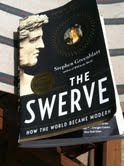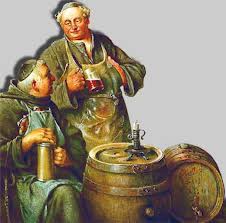 You may have been with me since the first “My Wobbly Bicycle” post last December, when I first told you about my cancer. I’m thinking of all the ways one might read the arc of these posts: (1) an opportunistic and narcissistic spilling of the guts; (2) a brave and aware facing of a serious illness; (3) evidence of the grace of God and the power of many prayers; (4) my own little self-help-by-writing-program; (5) evidence of the value of meditation; (6) my simply doing what I do, which is writing stuff down. Which of these is “true”? What have I left out?
You may have been with me since the first “My Wobbly Bicycle” post last December, when I first told you about my cancer. I’m thinking of all the ways one might read the arc of these posts: (1) an opportunistic and narcissistic spilling of the guts; (2) a brave and aware facing of a serious illness; (3) evidence of the grace of God and the power of many prayers; (4) my own little self-help-by-writing-program; (5) evidence of the value of meditation; (6) my simply doing what I do, which is writing stuff down. Which of these is “true”? What have I left out?
Here’s what I said that gave me the title, “My Wobbly Bicycle”:
We pretend there’s some solidity, some predictability. But being alive is more like riding a bicycle, balancing on two thin tires. Eventually we’ll fall one way or the other, but for the moment, we’re upright. It’s exciting, sometimes frightening.
It’s easy to pretend there’s solidity by choosing one of the numbers above, 1-6, and ruling the others out. My way or the highway. Of course we know that quantum mechanics says this isn’t true, but we dearly love a story arc, and the only way we get one is to ignore the others. Honestly, I don’t think we can live without our stories. It’s just that we take them as the Truth. . . . .
Case in point. In last week’s post, I praised Greenblatt’s The Swerve, that traces the beginning of modern thought primarily to the re-discovery of Lucretius’ On the Nature of Things.” I’d read no reviews or commentary before I reported to you. Woe unto my students if they’d done that. An opinion/belief/point of view is only as trustworthy as the work that’s gone into seeing what ELSE is out there. I need to know what the larger community of historians say about this book. 
There’s a long review of The Swerve by Jim Hinch in the L.A. Times, another in The Guardian, and others that came out when the book was winning so many prizes. From Hinch: “The Swerve did not deserve the awards it received because it is filled with factual inaccuracies and founded upon a view of history not shared by serious scholars of the periods Greenblatt studies.”
He says: “Greenblatt’s vision is not true, not even remotely. As even a general reader can gather from a text as basic as Cambridge University historian George Holmes’ Oxford Illustrated History of Medieval Europe (1988): ‘Western civilization was created in medieval Europe. The forms of thought and action which we take for granted in modern Europe and America, which we have exported to other substantial portions of the globe, and from which indeed we cannot escape, were implanted in the mentalities of our ancestors in the struggles of the medieval centuries.’”
 He points out that there was much less self-flagellation and hair-shirt wearing in Medieval monasteries than Greenblatt says, and much more secularism, ribaldry, drinking, etc. He gives many examples.
He points out that there was much less self-flagellation and hair-shirt wearing in Medieval monasteries than Greenblatt says, and much more secularism, ribaldry, drinking, etc. He gives many examples.
And the hoards of invaders that supposedly destroyed the culture of Rome? They quickly assimilated and within decades, the areas they invaded became major centers of learning. Again, many examples.
And, he points out, “many of the supposed religious values scorned by Lucretius — faith, self-sacrifice, an identity shaped not by individual desire but by family and community — remain widespread in western and non-western cultures and are in no way inimical to human freedom and progress.”
Hinch says it is all a “vastly more complicated, interesting and indeterminate story. . . . Notions such as the Middle Ages and the Renaissance are little better than shorthand for arbitrarily bracketed periods of time in which certain changes in the pattern of human life are interpreted as significant and others are not.”
Oh well, the book tells a good story, with no doubt some truth in it. I learned a lot, in any case.
You can probably think of hundreds of other examples, including of course politics and religion, that lay their own private grid over the ever-flowing river of reality. I just thought of another: the new DSM-5, that re-interprets certain human behavior as mental illness, certain others not. Each edition redraws the lines.
Which brings me back to my cancer, which I’ve barely mentioned so far. Hooray! I’m turning my attention away from this difficult time. Was it “difficult”? Another interpretation. It was what it was, some days I felt bad, some pretty good. If I am fortunate enough to live many years after this, how will I talk about this year? What would be a good story of it?
How am I now? Tired, tired, tired, but feeling better every day. Walking some every day, even if it’s only 15 minutes. My long afternoon naps are getting a bit shorter, it seems. And I got my hearing tested yesterday—happily, the chemo didn’t further damage my already bad ears. (Chemo destroys cilia in the cochlea)
I’m going to keep using the title “My Wobbly Bicycle” until a year has passed since my diagnosis. I want to let you know, under that rubric, how my whole hairless year evolves.
 Hairless? Is that the truth? No, I still have a suggestion of eyebrows and little stubbles of eyelashes, the left more so than the right. You should try putting mascara on stubble. It gets all over my eyelids. Looking good has been really complicated this year.
Hairless? Is that the truth? No, I still have a suggestion of eyebrows and little stubbles of eyelashes, the left more so than the right. You should try putting mascara on stubble. It gets all over my eyelids. Looking good has been really complicated this year.
